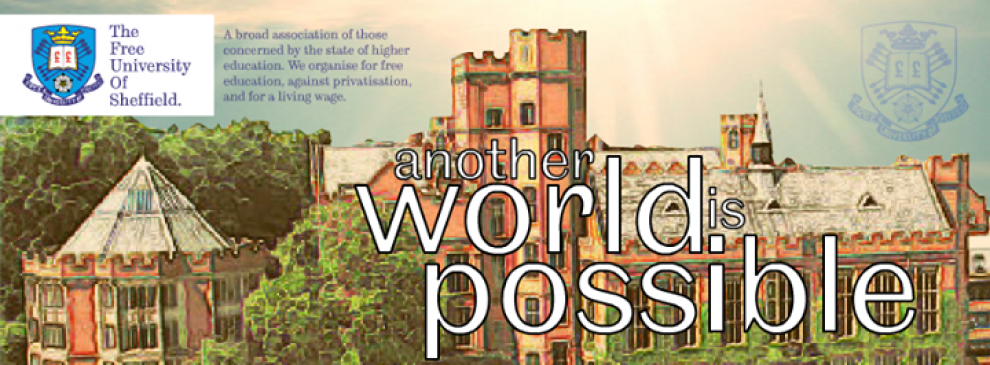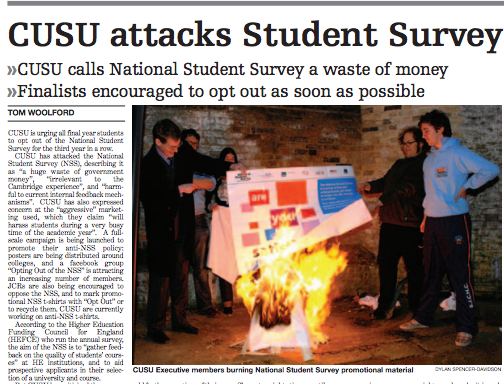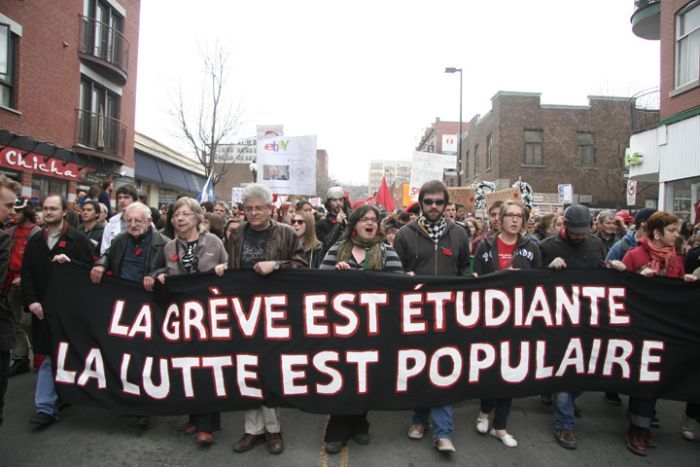The following is an opinion piece by Charlotte, one of our members; it is not an official statement by the Free University of Sheffield.
This talk was originally given as part of a Free Uni discussion meeting called Free Education: Why Do We Want It? Free Uni runs open discussion meetings every other Tuesday at 6:30pm, alternating with weeks where we focus on organising. Check our Facebook page for updates if you fancy coming along in future!
This discussion on free education and queer liberation can only give a small sense of the wide-reaching interconnection between the two struggles; it would be great to hear feedback from others, too. As a point of clarification, I will be using ‘queer’ as an umbrella term for members of the community as a whole; I’m aware that not everyone is comfortable with its reclamation, and if any LGBT+ reader experiences discomfort with this (or anything I say here) I would be very open to your critique.
It’s something I like to re-affirm to myself generally, as an activist, and something that’s important to start with here: the history of queerness is intensely political. We know that Stonewall started with a riot; here in Sheffield, 100 years ago, activist and writer Edward Carpenter mobilised for socialism, environmentalism and women’s liberation, directly connecting these causes to his experience as a gay man. (More on Edward Carpenter can be found at www.friendsofedwardcarpenter.co.uk).
The political nature of queerness does not diminish with the passage of time. Though much has changed in the contemporary experience of being LGBT+, major developments in queer rights are often coupled with cishet society’s attempts to depoliticise our identities and discredit our anger at the injustices we still face. The mainstream media often frames the legalisation of gay marriage as the end point in our narrative of struggle. Rainbow flags emblazoned on corporate brands tap into queer consumers as a new ‘niche market’. We are expected to beam with gratitude at the police officers dancing at pride rallies, as if the police have not consistently enacted violence against us or turned a blind eye towards queerphobic hate crime (something which happened in Sheffield only this year: http://www.bbc.co.uk/news/uk-england-south-yorkshire-36985098).
Our lives are political, crucially political, because the mechanisms of society continue to structurally oppress LGBT+ people. Cuts to the NHS continue to diminish trans people’s access to free medical care, whilst the medical system itself is routinely discriminatory. Despite our higher risk of suicide, healthcare cuts affect LGBT+ people’s access to crucial mental health care. The legal system continues to do violence to queer people of colour, whilst racist attempts to close our borders make it increasingly difficult for queer people to seek asylum from hate crime in the UK.
I could go on, but here is my main point: the continuing assault on higher and further education is bound up in the oppression of queer people, too. The removal of the Education Maintenance Allowance, the abolition of student maintenance grants, and the introduction of the Teaching Excellence Framework (threatening unbridled increases in tuition fees) makes it increasingly difficult for people in precarious financial situations to access further or higher education. The government’s tacit assumption that familial financial support is always around to supplement the maintenance of students and cushion their debt—an assumption favourably geared towards middle-class families—also overlooks the experience of queer people, whose identities often lead to estrangement from their families. The impact of austerity on HE/FE creates further precarity for queer people dealing with the financial pressures of transition.
Our ability to participate in the university is essential for making changes to the treatment and safety of queer people on university campuses. The increasing cuts to university budgets mean they channel money into student recruitment, often in ways that don’t benefit the students already present, or the quality of education itself. This directs time and money away from the development of safe and inclusive spaces for LGBT+ students; The Diamond, for example, is the university’s new showpiece, but only includes one gender neutral toilet.
But of course—like everything about free education activism—fees and funding are tied to wider-reaching considerations. The threat to LGBT+ participation in higher education enables educational institutions to continue to shut out queer voices, both those of students, and of staff, who must face the financially fraught and exploitative pathway to academic employment. We need syllabuses and seminars which do not erase and oppress queer contributions to, and visions of, history, medicine and science, literature and art, geography, philosophy and sociology; the list continues.
As a marginalised group, our voices must be amplified; amplification isn’t about filtering queer voices through an institutional megaphone which ultimately remains cishet in structure. It’s not about acts of performative allyship, such as fulfilling representational quotas by shoehorning a lecture on queer theory into a hetero/cis normative philosophy module. It’s about queer people leading, queer people participating, and queer people speaking for themselves. Active participation is integral to the structure of a free university, whereby students are not just passive consumers, but also co-producers of knowledge. Our community is fluid—as we gain new confidence and understanding, it grows and evolves—foregrounding and hearing our voices is essential in this process.
One of the people who attended the talk raised a brilliant question at this point: to what extent does fighting for representation and amplification in a structure which, ideally, we would overthrow and rebuild, represent settling for something, accepting a bone which the university has thrown us? I think this question is attendant on all activism: free education, queer liberation, or otherwise. I’m still mulling over this—and would love to hear anyone else’s thoughts—here are my initial ideas.
Queerness is ultimately about radical receptivity, radical community; connections between people so radical, so limitless, that they threaten the very cohesion of cishet patriarchal society. The history of queer liberation is about solidarity, forming a community so strong it can continue to fight back against centuries of oppression. At its best—when all the voices and identities it encompasses are amplified— queerness is antithetical to the atomising values of capitalism and marketization which underpin the current education system. It strikes me that a university where queer people are able to speak, where we contribute to knowledge-creation and the university’s overall operation, cannot remain structurally the same.
These thoughts sprung to mind after hearing the word ‘solidarity’ come up over and over again in the open discussion after my talk: we agreed that solidarity, the mobilisation and collective resistance of different people together, was essential for the success of the free education cause. We have to build bridges between colleges and universities; students, academics, and non-teaching staff; universities and their surrounding communities; students and workers: or our movement is exclusionary and stands for no-one. I think there are many lessons we can learn from the queer community about collective resistance and radical, all-encompassing solidarity. But the question we ended the discussion on–which I will leave open–is, although solidarity and community sound great on paper, how do we enact them meaningfully in practice?
I have attempted to show that the education system’s oppression of queer people goes much deeper than management’s decision to have staff members wear rainbow-coloured lanyards can resolve. As a community, we need to reclaim our anger, and mobilise against the way queerphobic oppression manifests in the structure of the university; a big part of this is, as my friend put it, queering the university: extending our own system, one of radical and wide-reaching solidarity.





